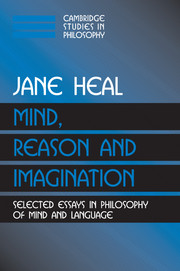Book contents
- Frontmatter
- Contents
- Preface
- Sources
- Mind, Reason and Imagination
- 1 Introduction
- PART I MIND, THEORY AND IMAGINATION
- 2 Replication and Functionalism
- 3 Understanding Other Minds from the Inside
- 4 Simulation, Theory and Content
- 5 Simulation and Cognitive Penetrability
- PART II THOUGHT AND REASON
- PART III INDEXICAL PREDICATES AND THEIR APPLICATIONS
- PART IV THINKING OF MINDS AND INTERACTING WITH PERSONS
- References
- Index
3 - Understanding Other Minds from the Inside
Published online by Cambridge University Press: 18 December 2009
- Frontmatter
- Contents
- Preface
- Sources
- Mind, Reason and Imagination
- 1 Introduction
- PART I MIND, THEORY AND IMAGINATION
- 2 Replication and Functionalism
- 3 Understanding Other Minds from the Inside
- 4 Simulation, Theory and Content
- 5 Simulation and Cognitive Penetrability
- PART II THOUGHT AND REASON
- PART III INDEXICAL PREDICATES AND THEIR APPLICATIONS
- PART IV THINKING OF MINDS AND INTERACTING WITH PERSONS
- References
- Index
Summary
Can we understand other minds ‘from the inside’? What would this mean? Many have felt an attraction to the idea that creatures with minds, people (and perhaps animals), invite a kind of understanding which inanimate objects such as rocks, plants and machines do not invite, and that it is appropriate to seek to understand such animate creatures ‘from the inside’. What I hope to do in this essay is to introduce and defend one version of the so-called simulation approach to our grasp and use of psychological concepts, a version which gives central importance to the idea of shared rationality, and in so doing to tease out and defend one strand in the complex of ideas which finds expression in this mysterious phrase. Talk of persons ‘having a point of view’, and of there being such a thing as ‘what it is like’ to be that person, are also part of the same set of ideas. (But I would like to stress that the whole issue of the existence of ‘qualia’ is not touched on at all in what follows.)
I would like here to introduce the salient ideas of the simulation approach. Simulationism is best understood by contrast with another approach in philosophy of mind which has, at least among Anglo-American analytic philosophers, been the dominant one of the last decades and which has also been an important influence on psychologists and cognitive scientists. We may call this familiar alternative the ‘theory theory’.
- Type
- Chapter
- Information
- Mind, Reason and ImaginationSelected Essays in Philosophy of Mind and Language, pp. 28 - 44Publisher: Cambridge University PressPrint publication year: 2003
- 1
- Cited by

